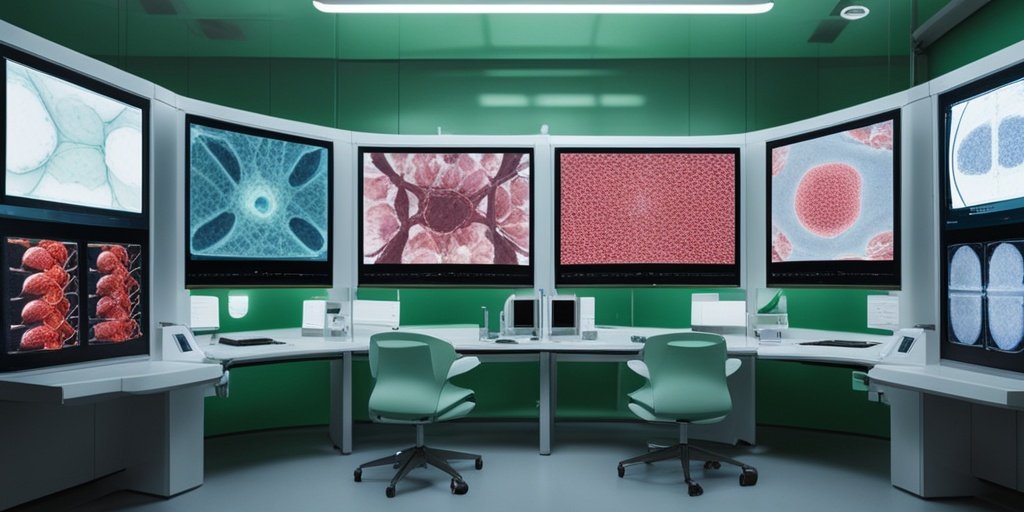⚡ Quick Summary
This article examines the transformative role of artificial intelligence (AI) in the field of uropathology, highlighting its potential to enhance the diagnosis, grading, and prognostication of urological cancers. The use of deep learning algorithms has shown significant promise in improving the accuracy and efficiency of pathology workflows.
🔍 Key Details
- 📊 Focus: Application of AI in uropathology
- 🧩 Technologies: Deep learning algorithms
- 🏥 Context: Rising cancer cases due to an aging population
- 📈 Goals: Improve tumor classification and prognostic factor identification
🔑 Key Takeaways
- 🌍 Global Challenge: Increasing cancer cases necessitate advanced diagnostic tools.
- 🤖 AI’s Role: AI offers new prospects in diagnostics, particularly in pathology.
- 📊 Enhanced Accuracy: Deep learning algorithms improve diagnostic precision.
- 🏆 Efficiency Gains: AI can streamline pathology workflows, reducing workload.
- 🔍 Prognostic Insights: AI aids in identifying prognostic and predictive factors.
- 💡 Future Potential: Embracing AI could lead to better patient outcomes.
- 📚 Comprehensive Review: The article provides an insightful overview of AI’s applications in uropathology.

📚 Background
The global population is currently at an all-time high, with approximately 7.8 billion people living on Earth. This demographic shift has led to a notable increase in cancer cases, largely due to improved management of cardiovascular diseases and a growing elderly population. As a result, pathologists are facing an increased workload, which underscores the need for innovative solutions in cancer diagnostics.
🗒️ Study
This article provides a comprehensive review of the impact of artificial intelligence in uropathology, focusing on its applications in diagnosing, grading, and prognosticating various urological cancers. The authors, Leite KRM and Melo PAS, delve into the primary data surrounding AI’s utilization in this specialized field, emphasizing the importance of specialized expertise in tumor classification.
📈 Results
The findings indicate that deep learning algorithms have the potential to significantly enhance the accuracy and efficiency of pathology workflows. By leveraging AI, pathologists can achieve better diagnostic outcomes, which is crucial for effective patient management and treatment planning.
🌍 Impact and Implications
The integration of AI in uropathology could revolutionize the way we approach cancer diagnostics. By improving the accuracy of tumor classification and prognostic factor identification, AI not only alleviates the burden on pathologists but also enhances patient care. The implications of these advancements are profound, paving the way for improved treatment strategies and outcomes for patients with urological cancers.
🔮 Conclusion
This article highlights the transformative potential of artificial intelligence in uropathology. By embracing these technological advancements, we can look forward to a future where diagnostics are more accurate and efficient, ultimately leading to better patient outcomes. The journey towards integrating AI into medical practice is just beginning, and further research in this area is essential for maximizing its benefits.
💬 Your comments
What are your thoughts on the role of AI in uropathology? We would love to hear your insights! 💬 Share your comments below or connect with us on social media:
Artificial Intelligence in Uropathology.
Abstract
The global population is currently at unprecedented levels, with an estimated 7.8 billion people inhabiting the planet. We are witnessing a rise in cancer cases, attributed to improved control of cardiovascular diseases and a growing elderly population. While this has resulted in an increased workload for pathologists, it also presents an opportunity for advancement. The accurate classification of tumors and identification of prognostic and predictive factors demand specialized expertise and attention. Fortunately, the rapid progression of artificial intelligence (AI) offers new prospects in medicine, particularly in diagnostics such as image and surgical pathology. This article explores the transformative impact of AI in the field of uropathology, with a particular focus on its application in diagnosing, grading, and prognosticating various urological cancers. AI, especially deep learning algorithms, has shown significant potential in improving the accuracy and efficiency of pathology workflows. This comprehensive review is dedicated to providing an insightful overview of the primary data concerning the utilization of AI in diagnosing, predicting prognosis, and determining drug responses for tumors of the urinary tract. By embracing these advancements, we can look forward to improved outcomes and better patient care.
Author: [‘Leite KRM’, ‘Melo PAS’]
Journal: Diagnostics (Basel)
Citation: Leite KRM and Melo PAS. Artificial Intelligence in Uropathology. Artificial Intelligence in Uropathology. 2024; 14:(unknown pages). doi: 10.3390/diagnostics14202279